The cross-sectional implications of the social discount rate
Maya Eden (Brandeis University)
GPI Working Paper No. 12-2021, published in Econometrica
How should policy discount future returns? The standard approach to this normative question is to ask how much society should care about future generations relative to people alive today. This paper establishes an alternative approach, based on the social desirability of redistributing from the current old to the current young. Along the balanced growth path, bounds on the welfare gains from age-based redistribution imply bounds on the social discount rate. A calibration shows that an objective of maximizing the sum of utilities in each period implies social discount rates that are within a percentage point of the market interest rate.
Other working papers
Desire-Fulfilment and Consciousness – Andreas Mogensen (Global Priorities Institute, University of Oxford)
I show that there are good reasons to think that some individuals without any capacity for consciousness should be counted as welfare subjects, assuming that desire-fulfilment is a welfare good and that any individuals who can accrue welfare goods are welfare subjects. While other philosophers have argued for similar conclusions, I show that they have done so by relying on a simplistic understanding of the desire-fulfilment theory. My argument is intended to be sensitive to the complexities and nuances of contemporary…
Meaning, medicine and merit – Andreas Mogensen (Global Priorities Institute, Oxford University)
Given the inevitability of scarcity, should public institutions ration healthcare resources so as to prioritize those who contribute more to society? Intuitively, we may feel that this would be somehow inegalitarian. I argue that the egalitarian objection to prioritizing treatment on the basis of patients’ usefulness to others is best thought…
Is In-kind Kinder than Cash? The Impact of Money vs Food Aid on Social Emotions and Aid Take-up – Samantha Kassirer, Ata Jami, & Maryam Kouchaki (Northwestern University)
There has been widespread endorsement from the academic and philanthropic communities on the new model of giving cash to those in need. Yet the recipient’s perspective has mostly been ignored. The present research explores how food-insecure individuals feel and respond when offered either monetary or food aid from a charity. Our results reveal that individuals are less likely to accept money than food aid from charity because receiving money feels relatively more shameful and relatively less socially positive. Since many…

